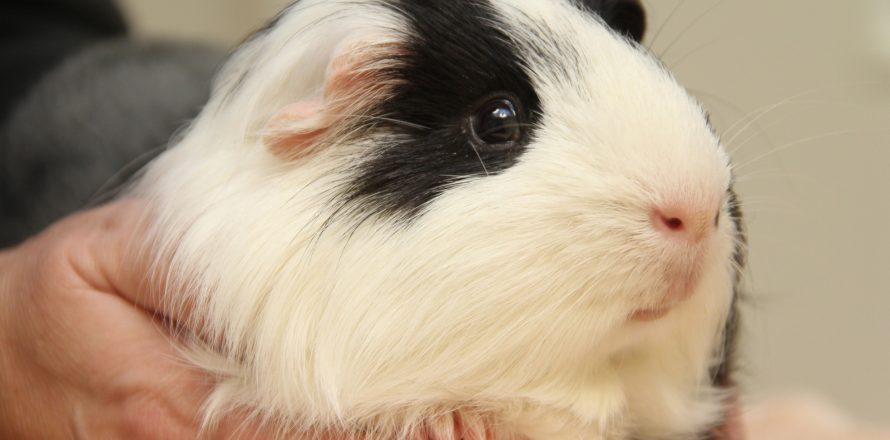
Kirby’s problem started two months ago. He’s normally an active, playful guinea pig; when he became dull and quiet, Jay knew that there must be something wrong. He watched him carefully, and noticed that Kirby was in pain when passed urine: he squealed shrilly.
I examined Kirby
When Jay brought him in to see me, Kirby seemed bright and active, scurrying around normally. An examination of a guinea pig is similar to a dog or a cat: I checked his ears, eyes and mouth, listened to his chest with a stethoscope, and took his temperature. Everything seemed normal until I palpated his abdomen, gently squeezing his tummy to feel for any abnormality. He was relaxed at first, but when I moved my fingers to press over the area of his bladder, Kirby squealed loudly: there was definitely a focus of pain there.
The principles of most diseases are the same across all species. In guinea pigs, just as in humans, pain on urination can be caused by a number of conditions, including kidney stones and urinary tract infections. Kirby passed urine while I was examining him, which was useful: I was able to have it checked in our clinic laboratory. His urine was cloudy to look at, and at first I thought that it might contain crystals and tiny stones. However, when I examined the urine under the microscope, there was no sign of these. Instead, I found large quantities of white blood cells: Kirby was suffering from a serious urinary tract infection. I took xray pictures of his abdomen, and these confirmed that there was no sign of kidney or bladder stones.
Treatment
Treatment was simple: a course of antibiotics. These need to be used with care in small herbivores such as guinea pigs and rabbits: they need the resident bacteria in their digestive tract to help to digest the food. If the wrong type of antibiotic is given, these bacteria can be killed off, and the animals can suffer dramatic and potentially fatal reactions. Kirby was given a course of a safe antibiotic, and he rapidly returned to normal.
Soon after Christmas, the problem recurred: again, Kirby went quiet, and when he squatted to pass urine, he squealed. He was brought in to see me again, and this time, we needed to try something different, to ensure that the problem did not keep coming back. A urine sample has been sent off to the laboratory to be cultured, to try to isolate the bacteria causing the problem. Sometimes a specific antibiotic may be needed: the laboratory results will guide us towards the most effective antibiotic to use.
We’re also going to use a less conventional seasonal treatment for Kirby: cranberries. These have been used to prevent urinary tract infections in humans for over a hundred years. Research has shown that chemicals in cranberries interfere with the ability of some bacteria to attach themselves to the lining of the urinary tract. Cranberry juice is widely used in human medicine as an alternative way of preventing urinary tract infections.
When I carried out some research with my alternative-medicine veterinary colleagues, I discovered that cranberries have also been used successfully for guinea pigs. I heard about one male guinea pig who was treated with three raw cranberries every day: his recurrent urinary tract infections cleared up completely.
Kirby has been sent home with the same prescription: he’ll enjoy fresh cranberries at this time of year, and then thawed-out frozen cranberries when they are out of season. Jay tells me that he loves eating different fruits and vegetables as treats, so there will be no problem getting these into him.
Kirby has started onto his new treatment already, and judging from the way he gobbled up the cranberries, he’s going to enjoy it.
Tips
- Guinea pigs can suffer from the same sort of illnesses as humans, dogs and cats
- Urinary tract infections can be painful and distressing
- Veterinary treatment is essential to provide rapid relief




Please note that I am unable to answer veterinary questions in comments. If you have questions or concerns about your pet's health it is always better to contact your vet.